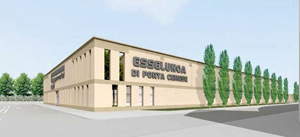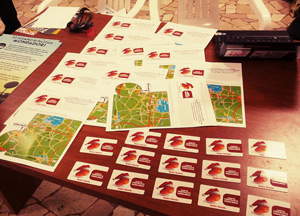Esselunga's fall from grace on supermarket at Palazzo Te: vouchers given away to Mantuans
The Esselunga project in Mantua has been much talked about. The intention is to build in the Porta Cerese area, close to Palazzo Te, a supermarket of the chain that will replace the old and dilapidated sportshall1. Summing up what has been said in recent months, what are the reasons for the no vote on the project? The first is purely economic in nature. Typically, initiatives like this one all start out under the guise of “job creation,” but no one usually thinks about the jobs that will actually be lost, since it is well known that large organized distribution harms small stores and neighborhood stores. Stefano Gola, president of the Mantua section of Confcommercio2, is of this opinion. In addition, Sergio Cordibella, the president of the Mantua section of Italia Nostra, pointed out, it would be an unnecessary development since Mantua has an average of 546 square meters of commercial settlements per thousand inhabitants, compared to the average of 274 in Lombardy and 228 in Italy3.
The second reason concerns more closely the historical-artistic heritage. Esselunga’s project involves not only the construction of a store with 2,500 square meters of sales area only (but more than 4,000 of footprint)4, but also the modification of the road system in the Porta Cerese area in order to avoid inconvenience to citizens, considering a greater influx of traffic due to people heading to the supermarket. In an area already subject to traffic that is certainly not the most sympathetic, all this would lead to further problems related to the preservation of Palazzo Te due to increased smog and pollution. Without calculating, of course, the inconvenience to the residents of the neighborhood. And the fact that Palazzo Te would be at the center of new traffic circles, new railway underpasses and whatnot: not bad, for a palace that was born as a pleasure residence.
The third reason, which still concerns historical and artistic heritage, involves the recognition of Mantua as aUNESCO World Heritage Site. According to this recognition, the area on which the supermarket is to be built is included in the so-called"Buffer Zone“ (which in Italian we could translate as ”buffer area")5, which according to UNESCO “serves to provide an additional level of protection to World Heritage sites,” and this is because "many World Heritage sites face problems arising, directly or indirectly, from the situation of their buffer zones. New construction within a buffer zone could have an impact on the site and could threaten its Outstanding Universal Value."6 By the latter term, simplified to OUV, we mean, trivializing, the cultural, historical, landscape value that the site possesses and that makes it worthy of inclusion in the list of protected sites. As Sandro Mortari explained in an article in the Gazzetta di Mantova titled Incognita Unesco on the PortaCerese plan7, the construction in the buffer zone of such an impactful building could lead Unesco to consider removing Mantua from the World Heritage List. It would thus lengthen the sad list of Italian sites at risk. And this is not to dwell on the protection constraints to which the area is subjected by the Superintendence.
The usual ones who accuse of inaction those who instead want to protect our historical and cultural heritage can keep quiet this time, because Italia Nostra has put forward two alternative proposals for the recovery of the arena area: the creation of a park that would thus add green spaces to an area that is already distinguished by the conspicuous presence of greenery (and this would be the most beautiful and most desirable solution), or the recovery of the sports arena to make it return to its original functions8. Or again, recently a group of young architects has proposed recovering the sports hall to turn it into a covered market for the promotion of zero-mile products9. In short, attempts are being made to avert the construction of a building with a strong impact on the landscape (below is a picture of what the supermarket is to look like) and that will radically alter the area’s road system by bringing more traffic and more pollution.
However, the patron of Esselunga, Bernardo Caprotti, has no intention of giving up: just before Christmas, the company sent a letter to just under 25,000 Mantuan families in which it tries to explain the reasons in favor of the construction of the Porta Cerese store, with, moreover, quite questionable reasons (we read phrases such as “Traffic at Palazzo Te? We want to joke! The current supermarket overlooks Porta Cerese and we will eventually access it from there” or “a modern but discreet building, made with the same materials and colors as Palazzo Te”)10. But that’s not all: attached to this letter was a €30 discount voucher to spend in the Desenzano del Garda store. An initiative that comes across as a very bad fall in style on the part of Esselunga, which with this voucher would seem not only to offend the dignity of the Mantuan citizens, but also their intelligence (we would like to know who is willing to make a 100 km trip, from Mantua to Desenzano, 50 one way and 50 the return, just to do a 30 euro shopping). Citizens’ associations, which have already renamed the 30-euro voucher “30 deniers,” have launched initiatives aimed at collecting letters of vouchers from Mantuans protesting Esselunga11. Below is a photo of letters and vouchers posted on the Facebook page of the eQual social initiative group of Mantua, among the most active in the protest against Esselunga, with demonstrations, meetings, and initiatives:
We were talking just yesterday on our website about how another supermarket chain (albeit with a totally different target audience), Eataly, offers an example of entrepreneurial culture certainly not to be imitated, with its trivialization of the Renaissance and with employees paid 8 euros gross per hour, a wage deemed fair by the chain’s president. From Florence, we move today to Mantua to note how much need there is for more business ethics: not only because a well-known brand of organized retail proposes an impactful project in an area subject to Unesco and Soprintendenza constraints of respect, but also (and above all) because of the scant consideration of the citizens who oppose such a project.
Notes
1
. Cf. Emanuele Salvato, Mantua, supermarket near Palazzo Te. At risk of Unesco recognition, from Il Fatto Quotidiano, February 23, 2013. ↑
2. Cf. Esselunga project. Merchants baton, from La Gazzetta di Mantova, April 20, 2013. ↑
3. See article cited in footnote 1. ↑
4. Cf. Esselunga gives away €30 shopping vouchers. Here’s what’s behind it, from Investireoggi.it, December 19, 2013. ↑
5. From this link, on the Ministry of Cultural Heritage website dedicated to our UNESCO sites, by selecting Mantua in the drop-down menu, it is possible to observe the map with the site and the buffer area. ↑
6. International Expert meeting on World Heritage and buffer zones, from the officialUNESCO website. Translation from English is ours. ↑
7. Sandro Mortari, Incognita Unesco on the Porta Cerese plan, from La Gazzetta di Mantova, November 24, 2012. ↑
8. “Area exchange for Esselunga,” from La Gazzetta di Mantova, November 20, 2013. ↑
9. Young architects redesign Mantua. And they fail Esselunga, from La Gazzetta di Mantova, September 22, 2013. ↑
10. Emanuele Salvato, Esselunga criticized for opening in Mantua. Responds by giving away €30 shopping vouchers, from Il Fatto Quotidiano, December 18, 2013. ↑
11. Esselunga card battle breaks out, from La Gazzetta di Mantova, December 21, 2013. ↑
Warning: the translation into English of the original Italian article was created using automatic tools. We undertake to review all articles, but we do not guarantee the total absence of inaccuracies in the translation due to the program. You can find the original by clicking on the ITA button. If you find any mistake,please contact us.





























